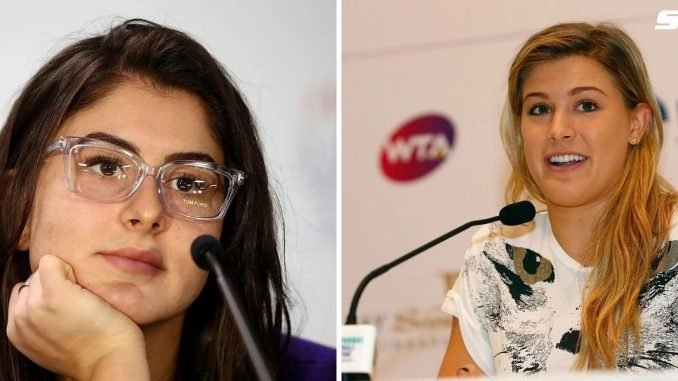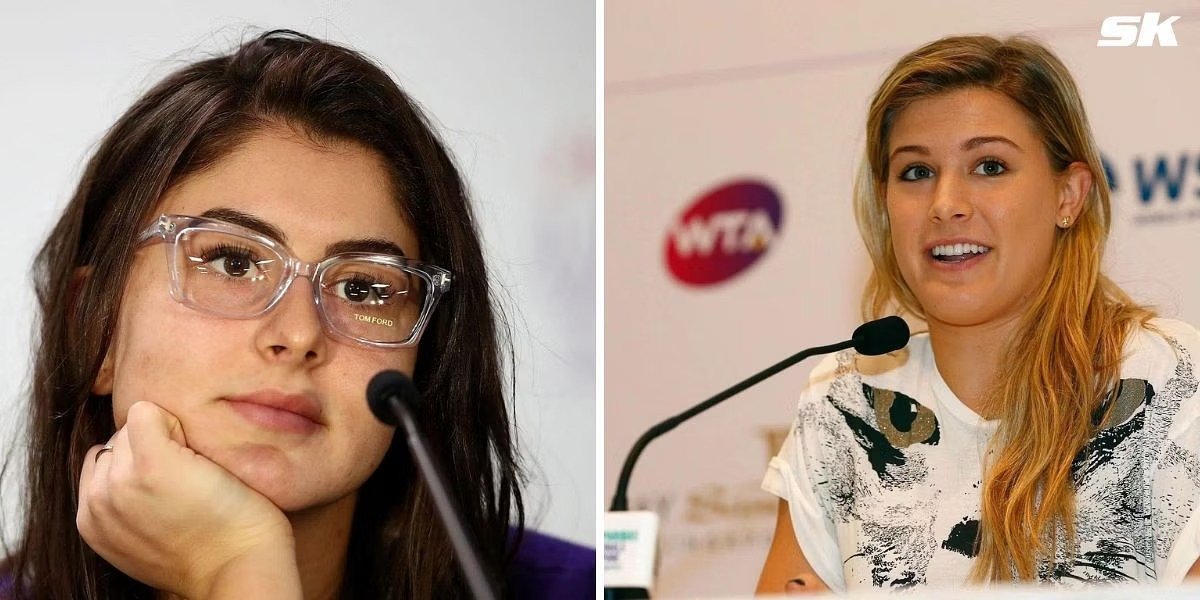
“Omg, That’s the Worst”: Eugenie Bouchard & Bianca Andreescu Hilariously Bond Over Their Mutual Dislike of Warm-Up Sessions

In the high-stakes world of professional tennis, where rigorous training and discipline are the norms, it’s refreshing to see athletes bond over shared experiences and quirks.
Canadian tennis stars Eugenie Bouchard and Bianca Andreescu recently provided a delightful glimpse into their camaraderie as they hilariously connected over their mutual disdain for warm-up sessions. This light-hearted moment not only highlights their personalities but also provides fans with a relatable and humorous look at the behind-the-scenes aspects of a professional athlete’s life.
#### The Unlikely Bond
Eugenie Bouchard and Bianca Andreescu, two of Canada’s most prominent tennis players, have carved their own unique paths in the sport.
Bouchard, once a Wimbledon finalist and a top-10 player, has faced her share of ups and downs, battling injuries and form issues. Andreescu, on the other hand, burst onto the scene with a stunning victory at the 2019 US Open, showcasing her immense talent and tenacity.
Despite their different journeys, the two have found common ground in their dislike for one aspect of their rigorous training regimes: warm-up sessions.
In a candid and humorous exchange, Bouchard and Andreescu shared their thoughts on this often-overlooked part of their routines, revealing a more relatable and human side to their lives as professional athletes.
#### The Hilarious Exchange
The conversation between Bouchard and Andreescu unfolded in a series of social media posts and interviews, where they openly expressed their mutual aversion to warm-ups.
Bouchard kicked things off with a post on Instagram, captioned “Omg, that’s the worst,” referring to the obligatory pre-match and pre-training warm-ups that athletes endure. Andreescu quickly chimed in, echoing Bouchard’s sentiments and adding her own humorous take on the topic.
Their playful banter resonated with fans, many of whom found the exchange both amusing and relatable. After all, who hasn’t groaned at the thought of warming up before a workout or physical activity?
The interaction between Bouchard and Andreescu provided a refreshing reminder that even elite athletes share common dislikes and can bond over the more mundane aspects of their routines.
#### The Reality of Warm-Ups
Warm-up sessions are a crucial part of any athlete’s regimen. Designed to prepare the body for the physical demands of training or competition, warm-ups help increase blood flow to muscles, enhance flexibility, and reduce the risk of injury.
Despite their importance, warm-ups are often seen as tedious and unexciting, a necessary chore that athletes must endure to perform at their best.
For professional tennis players like Bouchard and Andreescu, warm-ups can be particularly grueling.
These sessions often involve a combination of stretching, light cardio, and specific drills tailored to the demands of the sport. While necessary, they can feel monotonous and tiresome, especially when repeated day in and day out.
#### The Importance of Relatability
The candid exchange between Bouchard and Andreescu struck a chord with fans, not just because it was humorous, but because it humanized these high-profile athletes.
In a sport where players are often viewed through the lens of their achievements and performances, moments like these provide a valuable glimpse into their personalities and everyday experiences.
Relatability is a powerful tool in building a connection with fans. When athletes share their dislikes, struggles, and humorous anecdotes, it breaks down the barriers between them and their supporters.
Fans appreciate seeing that their idols experience the same frustrations and challenges, fostering a deeper sense of connection and admiration.
#### The Power of Social Media
Social media has revolutionized the way athletes interact with their fans. Platforms like Instagram and Twitter allow players to share snippets of their lives, engage with followers, and express their personalities beyond the confines of the tennis court.
Bouchard and Andreescu’s exchange is a prime example of how social media can be used to showcase the lighter side of professional sports.
Through their posts, Bouchard and Andreescu not only entertained their fans but also highlighted the camaraderie that exists among athletes.
Despite being competitors on the court, they share mutual respect and understanding, finding common ground in their shared experiences. This sense of community is a testament to the positive impact of social media in bringing athletes and fans closer together.
#### The Bigger Picture
While the humorous exchange between Bouchard and Andreescu is a light-hearted moment, it also sheds light on the broader realities of professional sports.
Athletes are often portrayed as invincible, driven solely by their pursuit of excellence.
However, they are also individuals with personal preferences, dislikes, and a need for connection and humor in their lives.
By openly discussing their aversion to warm-ups, Bouchard and Andreescu remind us that even the most dedicated athletes have aspects of their routines they don’t particularly enjoy.
This acknowledgment of the less glamorous parts of their training adds depth to their public personas and underscores the importance of balance in their lives.
#### Conclusion
Eugenie Bouchard and Bianca Andreescu’s hilarious bonding over their mutual dislike of warm-up sessions provides a refreshing and relatable look at the lives of professional athletes. Their candid exchange not only entertained fans but also highlighted the power of humor and relatability in building connections between athletes and their supporters.
As they continue their respective journeys in the world of tennis, moments like these remind us of the human side of sports. Behind the impressive performances and rigorous training regimes, athletes like Bouchard and Andreescu share common experiences and a need for camaraderie and laughter. Their ability to connect with fans on a personal level through humor and honesty is a testament to their enduring appeal and the positive impact of social media in bridging the gap between athletes and their audiences.
Leave a Reply